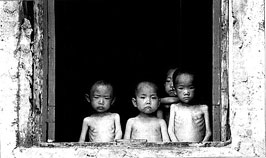For just one moment, let's forget about the angry politics surrounding North Korea. Let's forget about the nuclear weapons, the tense standoff with America and the bitter policy battles between conservatives and liberals.
For just one moment, let's remember what really matters--the people of North Korea. Three million Koreans have starved to death in the last decade. Hundreds of thousands are imprisoned in brutal labor camps. Koreans who have fled to China in search of food now constitute one of the world's largest refugees communities. Without protection from the international community, they live each day in life-or-death terror of being captured. China's current policy blatantly violates international law by forcibly returning refugees to North Korea, where they face torture or even execution simply for leaving their homeland.
Speaking out about human rights in North Korea should not be a controversial issue. Yet it's heartbreaking to hear the silence of South Korea's leading progressives. They are the traditional defenders of human rights in Korea. Even today, they have continued to fight bravely for the rights of minorities and women.
 | ||
These human rights groups and governments are not making excessive demands. They want an end to some of the most repressive practices, such as infanticide and human biological experimentation in the prison camps. No other country in the world practices guilt-by-association, routinely purging three generations of family members related to political offenders. Very few countries in the world today continue the practice of public executions. Not only has North Korea publicly executed people convicted of famine-related crimes it has also required elementary school children to witness them.
Speaking honestly on North Korea's human rights will not endanger a policy of economic engagement or a gradual plan for unification. Last month, when a British foreign official was visiting, North Korean officials admitted the existence of labor camps. The UK had gently pressured North Korea to discuss its human rights problem, but they also continued to emphasize economic aid. South Koreans should take note of this pushing for human rights won't always provoke angry threats. In fact, avoiding human rights may only damage South Korea's credibility as a leader in Northeast Asia. Other countries have already started to push ahead with their own policies regarding human rights in North Korea.
Perhaps there is hope among the younger generation. In the past year, I have sensed the emergence of genuine moderates among young South Koreans those who reject the easy solutions given by both hard-line conservatives and wide-eyed liberals. They support the engagement policy, gradual unification and peace on the Korean peninsula. But they have also read the news reports, they have seen the satellite photos of prison camps, they have looked into the eyes of haunted defectors and listened to their stories. Their conscience refuses to allow silence in the face of such suffering.
| There will be an all-day symposium on North Korean human rights at Yonsei University (GSIS) on Saturday, November 27. Speakers include young activists from the US, South Korea and North Korean defectors. Moderates are especially welcome to participate. The forum is open to the public and is free of charge. Contact suh@linkglobal.org for details. |


it's like that. reality bites and u don't seem to have seen any.